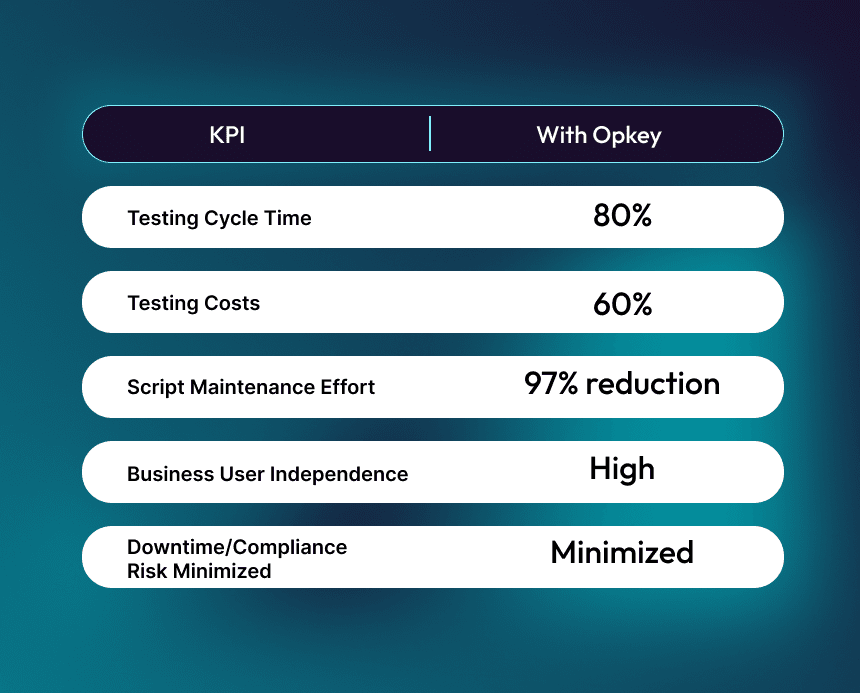Workday is a critical system for managing HR, finance, and business operations, and its regular updates ensure customers can leverage the latest features and innovations. With two major releases every year, organizations must validate that new changes don’t disrupt existing processes. Relying solely on manual testing is no longer feasible due to the scale and speed required, which is why more companies are adopting test automation.
While the benefits of automation are evident, measuring its true impact on Workday releases remains a challenge. In this blog, we’ll explore how to assess the real value of Workday test automation.
Beyond Managed Testing Services: Learn how Opkey gives you better control and agility with Workday. Download the Guide
How Test Automation Transforms Workday Release Testing
Test automation allows organizations to validate updates quickly, comprehensively, and with lower risk of disrupting critical business workflows. Instead of scrambling to get through testing, and hoping for no issues during every release cycle, automation provides reliable, repeatable and scalable test practices that deepen and strengthen over time.
Faster Adoption of New Features
Workday test automation speeds up the time it takes to complete regression testing giving you a competitive advantage. When Workday introduces new features, you spend less time testing and more time getting your teams up to speed with the latest improvements, so they can adopt and realize value that much faster, all while your competitors could still be tied up with manual testing and training.
Compliance and Business Continuity Assurance
Test automation strengthens Workday’s security testing in two critical areas: accuracy and business continuity. By reducing the risk of human error, it ensures continuous validation of security roles and permissions.
Automated tests can quickly detect misconfigured access rights, highlight vulnerabilities in user-role assignments, and help prevent unauthorized data exposure — a crucial capability for maintaining data protection and compliance in highly regulated industries such as healthcare, education, and utilities.
Automation also makes role and user-based permission testing more precise, ensuring that when user roles change, alerts and approval workflows are triggered instantly, reducing compliance risks and embedding safeguards sensitive HR and financial data.
Agility and Continuous Delivery
Workday test automation drives agility by aligning with DevOps practices. Test automation creates instant feedback loops, allowing teams to validate changes more frequently and at higher speeds, shortening the release validation cycle and enabling faster adoption of new Workday features. By reducing high pressure bottlenecks in late stages of development, and enabling continuous delivery, test automation arms enterprises with a more proactive, responsive and confident practice to embrace innovation.
Learn more: How to Build a Comprehensive Test Automation Framework for Workday
5 Ways to Measure the True Impact of Workday Test Automation
To understand whether your Workday test automation initiative is truly delivering value, you need to measure it against the right parameters. Here are five practical ways you can evaluate its success:
1. Shortened Testing Cycle Time
Look at how long it takes to complete regression testing before and after automation. If manual testing requires two to three weeks, automation now allows you to finish within a few days—or even overnight—you have a clear indicator of success.
2. Lower Testing Costs
Track the overall cost per release cycle. With automation, you should see reduced spending on manual hours, external consultants, and overtime. Since automated tests are reusable, the savings compound over multiple Workday releases.
3. Reduced Script Maintenance Effort
Measure how much effort your team spends maintaining test scripts after each Workday update. A good automation approach, especially with no-code or self-healing features, should drastically reduce this effort compared to traditional scripted testing.
4. Less Business User Dependency
Assess how much time HR, Finance, and IT end users are pulled into regression testing. Successful automation should free them from repetitive tasks and limit their role to exception handling or validating new features, rather than spending weeks supporting manual testing.
5. Reduced Downtime & Compliance Risk
Finally, consider the risks avoided. If automation helps you expand test coverage and catch defects early, you’re reducing the likelihood of payroll delays, reporting errors, or compliance breaches after a Workday release. Less downtime and fewer disruptions mean your automation is paying off.
Enter Opkey: Agentic AI for Workday Automation
Opkey’s Agentic AI-Native Enterprise Lifecycle Optimization for Workday transforms release testing:
AI-Driven Impact Analysis: As soon as a Workday update is released, Opkey automatically scans the environment to identify which configurations, business processes, and integrations are impacted. It then maps these changes to the relevant automated test cases, ensuring that only the necessary subset of regression tests is executed.
This drastically reduces testing cycles while maintaining full coverage of at-risk areas. Opkey helps enterprises stay compliant, minimize downtime, and adopt new Workday features with confidence.
Autonomous Self-Healing Technology: Workday’s frequent updates, dynamic UI elements, and evolving business configurations often cause test scripts to break, even if the underlying business process remains unchanged.
Opkey’s AI-powered self-healing test scripts perfectly address such challenges. When Workday updates introduce changes, Opkey’s engine automatically detects broken scripts and heals them in real time, drastically reducing the maintenance burden, keeping Workday automation suite resilient, scalable, and update ready.
True End-to-End Testing: Opkey enables comprehensive end-to-end risk coverage by automatically mapping business processes and identifying dependencies across Workday and integrated systems. Its AI-driven Business Process Discovery uncovers how workflows function in production, ensuring tests are built around real business usage, not assumptions. With pre-built Workday test accelerators and reusable test libraries, Opkey delivers broad coverage across HR, Payroll, and Finance, while also validating integrations with ERP and third-party applications.
This is what one of the Opkey’s client has achieved after implementing its Workday Lifecycle Optimization platform.
Quantifiable Impact: The Results That Matter

Learn how Opkey paved the way to modernized Workday management for a leading construction company. Read the Case Study






